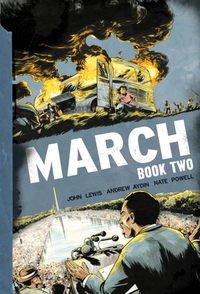You need to sign in or sign up before continuing.
Take a photo of a barcode or cover
dark
emotional
inspiring
fast-paced
challenging
dark
emotional
hopeful
informative
inspiring
reflective
sad
medium-paced
informative
inspiring
reflective
tense
fast-paced
My thoughts on this are pretty much the same as the first. It's a really wonderful book, I just personally struggle with the graphic novel format a bit. But I highly recommend the series.
dark
hopeful
informative
inspiring
fast-paced
challenging
emotional
fast-paced
Graphic: Hate crime, Physical abuse, Racial slurs, Racism, Violence, Police brutality
Moderate: Child abuse, Homophobia, Torture
challenging
emotional
informative
reflective
sad
tense
medium-paced
Book 2 continues the telling of history from book one. This one gets more intense as violence escalates and the different organizations in the movement become divided as to how to reach the end goals. I have so much respect for John Lewis already, but this book really opened my eyes to the details of what he and others in the 1960s endured to get the right to vote.
My minor criticism is that sometimes the text is really difficult to read and I didn't know what some of the illustrations were alluding to. It felt like you needed to know some moments in history to take in some of the scenes. While as an adult, I could mostly follow along, middle schoolers may have a difficult time picking up on some of the subtleties. Granted, I'm not normally a graphic novel reader, so perhaps I'm just not used to the style.
My minor criticism is that sometimes the text is really difficult to read and I didn't know what some of the illustrations were alluding to. It felt like you needed to know some moments in history to take in some of the scenes. While as an adult, I could mostly follow along, middle schoolers may have a difficult time picking up on some of the subtleties. Granted, I'm not normally a graphic novel reader, so perhaps I'm just not used to the style.
My review of this particular book is going to cover the entire trilogy. That feels appropriate for the format of this book, given that it's a graphic novel in three parts.
I learned about this series by watching the Rachel Maddow show, though John Lewis has been on other television shows, and I just recently saw him talk to Stephen Colbert about it on his show (pre-crowd surfing, as you do).
I am of the generation right behind the generation that lived through the events of the 1950s and 1960s, so I did not live through these events. I've grown up in the world that learned about and loved Dr. Martin Luther King, Jr., and all that he represented. I remember being moved by emotion when walking around the Martin Luther King, Jr. Memorial in Washington, D.C. (nestled between FDR's and Lincoln's memorials), and thinking that so much had happened to bring this monument there.
But the specifics of the history were otherwise unknown to me. Not that I was especially interested, but this novel comes out at a very crucial time in American politics, where equality is still not something that happens all the time everywhere we go. Racial and socioeconomic issues are still prevalent but otherwise hidden from view (they don't always make good news stories, after all).
So I like that this novel really gives a history of the civil rights movement in the 1950s and 1960s. John Lewis gives some engaging background information, and the rest of the book is about introducing regular figures in the movement, the different organizations of the movement, and allowing the reader to get the feel of what it was like to be a nonviolent protestor during this time. Several key events are highlighted (the death of the three freedom volunteers: Andy Goodman, James Chaney, and Mickey Schwerner; the bombing at the Sixteenth Street Baptist Church in Birmingham, AL; the assassinations of JFK and Malcolm X; and, of course, the march from Selma to Montgomery, which is where the book ends).
It helps that i'm already a big fan of John Lewis. But what I really like about this series is that it's so accessible to multiple generations. I easily read each of the first two books in a day; the last book was significantly longer and I was well distracted by other things. I thought the artistic choices were fantastic. To those who wonder why civil rights is such a big deal and why legislation like the voting rights act was crucial, this gets right to the heart of the matter. The story is woven in with President Barack Obama's inauguration, which is clearly also the impetus for the whole graphic novel project.
I learned about this series by watching the Rachel Maddow show, though John Lewis has been on other television shows, and I just recently saw him talk to Stephen Colbert about it on his show (pre-crowd surfing, as you do).
I am of the generation right behind the generation that lived through the events of the 1950s and 1960s, so I did not live through these events. I've grown up in the world that learned about and loved Dr. Martin Luther King, Jr., and all that he represented. I remember being moved by emotion when walking around the Martin Luther King, Jr. Memorial in Washington, D.C. (nestled between FDR's and Lincoln's memorials), and thinking that so much had happened to bring this monument there.
But the specifics of the history were otherwise unknown to me. Not that I was especially interested, but this novel comes out at a very crucial time in American politics, where equality is still not something that happens all the time everywhere we go. Racial and socioeconomic issues are still prevalent but otherwise hidden from view (they don't always make good news stories, after all).
So I like that this novel really gives a history of the civil rights movement in the 1950s and 1960s. John Lewis gives some engaging background information, and the rest of the book is about introducing regular figures in the movement, the different organizations of the movement, and allowing the reader to get the feel of what it was like to be a nonviolent protestor during this time. Several key events are highlighted (the death of the three freedom volunteers: Andy Goodman, James Chaney, and Mickey Schwerner; the bombing at the Sixteenth Street Baptist Church in Birmingham, AL; the assassinations of JFK and Malcolm X; and, of course, the march from Selma to Montgomery, which is where the book ends).
It helps that i'm already a big fan of John Lewis. But what I really like about this series is that it's so accessible to multiple generations. I easily read each of the first two books in a day; the last book was significantly longer and I was well distracted by other things. I thought the artistic choices were fantastic. To those who wonder why civil rights is such a big deal and why legislation like the voting rights act was crucial, this gets right to the heart of the matter. The story is woven in with President Barack Obama's inauguration, which is clearly also the impetus for the whole graphic novel project.
hopeful
informative
inspiring
reflective
tense
A stunning second volume in John Lewis's March series that chronicles his actions as a Freedom Rider through to the historic March on Washington, peppered with scenes from the inauguration of President Obama decades later. Excited to read the third and final volume in this beautifully told story of American history.
Graphic: Racial slurs, Racism, Violence







